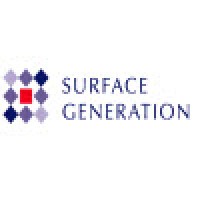
Surface Generation Limited
Game changers Surface Generation is a deep tech supplier of cutting edge manufacturing solutions whose patented Production to Functional Specification (PtFS) processing technologies enables advanced engineering customers in aerospace, automotive, energy, medical & consumer goods to leap-frog complexity, lightweighting and quality paradigms to create game changing products. Surface Generation is able to offer a one stop shop from off-the-shelf to turnkey ‘copy exact’ solutions tailored for users’ specific needs. Whether it’s simply a case of expanding an existing performance window, developing a totally new solution or even reimagining a product from first principles Surface Generation is uniquely positioned to help. Part of your team With the option of on or offsite running and access to extensive R&D, test and commissioning facilities, Surface Generations multi-disciplinary experts and dedicated hardware, automation, composites, moulding and optics teams, work alongside clients to deliver next generation solutions underpinned by our cutting edge research, development, proof-of-concept and low series demonstration processing offerings.






